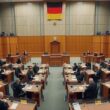Manfred Weber, head of the European People’s Party (EPP), has characterized a recent EU trade deal with the United States as a significant warning signal.
Weber stated that this agreement marks the first instance of a U.S. president leveraging American military strength to advance economic interests against Europe. He explained that Europe has historically relied on U.S. military protection, satellite data and intelligence sharing, factors which have demonstrably strengthened Washington’s negotiating position.
He described the EU as an “economic giant and a military dwarf” concluding that increased military investment is necessary if Europe intends to exert influence on the global stage. Weber advocates for a “dynamic of rearmament” arguing that Europe’s military weakness contributes to job losses within Germany. He stressed the need for Europe to become “more sovereign and stronger” pursuing geopolitical and economic diversification away from reliance on the United States.
He proposes bolstering Europe’s international standing through strengthened trade relationships, specifically highlighting the potential of a swift conclusion to the Mercosur agreement with South American nations, creating a trade zone encompassing 700 million people.
Weber also warns of the detrimental effects of rising nationalism within Europe, predicting it will cost the continent both prosperity and influence. He argued that a fragmented Europe of 27 individual nations would be vulnerable to manipulation by larger powers like the U.S. and China, contrasting this with the collective strength of a unified EU. He points out that the currently agreed upon tariffs could have been significantly higher if negotiated individually with each member state.
He outlined two central proposals to enhance Europe’s strategic autonomy: the development of independent European satellite systems to guide weapon systems and the creation of a European Cyber Brigade. He criticized the current dependence on U.S. satellite data for the operation of modern defense systems such as Patriot missiles, describing it as unacceptable. European satellite infrastructure, he argues, would not only ensure independence but also make the EU indispensable, as countries would require access to these systems for their defense needs, regardless of who is in power.
Weber proposed a European Cyber Brigade to address the borderless nature of cyber warfare and provide protection for smaller EU member states lacking the resources to defend their digital infrastructure independently.
He drew a parallel with the Euro, now deeply ingrained and irreversible, positing that Europe should strive for the same level of entrenchment in the realm of defense. Weber characterized the current moment as a “historic task” warning of a “historic failure” if Europe fails to commit to these defense projects as other nations invest in their own military capabilities. However, he expressed optimism, noting a growing momentum towards increased European cooperation on defense in recent years.





